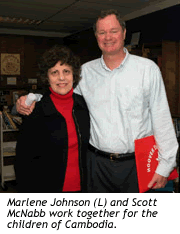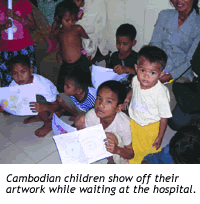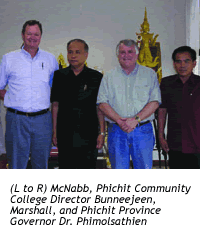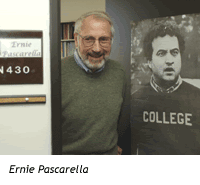|
EDUCATIONAL
POLICY & LEARDERSHIP STUDIES
Connecting
Service, Community, and Research
During winter break, Associate Professor Scott
McNabb and
Associate Dean Jim Marshall traveled half way around the
world to improve education, serve as goodwill ambassadors,
and learn a great deal along the way.
Cambodia
 When
students in Hoover Elementary School teacher Marlene Johnson’s
fifth- and sixth-grade classes heard that a University of
Iowa education professor was going to Cambodia, they got out
their pens, pencils, crayons and notebooks—and donated
them. When
students in Hoover Elementary School teacher Marlene Johnson’s
fifth- and sixth-grade classes heard that a University of
Iowa education professor was going to Cambodia, they got out
their pens, pencils, crayons and notebooks—and donated
them.
So, when McNabb and Marshall headed out for Southeast Asia,
they took a suitcase loaded with 50 pounds of donated items
and delivered them—along with $100 raised through a
bake sale—to the Angkor Hospital for Children.
The American-run hospital, which treats children from some
of the country’s poorest regions, will use the materials
to teach young patients about health issues and to provide
them with entertainment while they wait to be discharged.
 "When
we visited the hospital it was clear that the play therapist,
Pen Sinth, could make excellent use of the materials,”
McNabb said. “Through Mrs. Johnson’s efforts,
the Hoover students were able to make a tangible contribution
to children in Cambodia, a poverty-stricken country that has
been through an extraordinarily difficult time." "When
we visited the hospital it was clear that the play therapist,
Pen Sinth, could make excellent use of the materials,”
McNabb said. “Through Mrs. Johnson’s efforts,
the Hoover students were able to make a tangible contribution
to children in Cambodia, a poverty-stricken country that has
been through an extraordinarily difficult time."
McNabb said the donation was inspired by the visit to Iowa
City late last year by Arn Chorn-Pond, a well-known Cambodian
human rights activist who often speaks with schoolchildren
about his experiences growing up in a war-torn country.
Upon his return, McNabb brought a message for Hoover schoolchildren
from Arn on videotape he filmed in Siem Reap. He told the
students that Mrs. Johnson’s work is a model for international
education.
“ With a caring heart and generosity, the world comes
alive,” he said. “She’s made Cambodia more
than some abstraction on a map. She’s helped make it
a representation of an ongoing friendship with people like
Arn—a real, tangible, human connection and relationship
that can continue to be built upon.”

Thailand
 In
1999, Thailand’s educational system began the process
of reform. By moving from a highly bureaucratized system based
in Bangkok to a more decentralized system, the country’s
educators are attempting to respond more effectively to local
needs by developing local curriculum. One part of the reforms
is the development of a community college system for under-served
segments of Thailand’s rural population. In
1999, Thailand’s educational system began the process
of reform. By moving from a highly bureaucratized system based
in Bangkok to a more decentralized system, the country’s
educators are attempting to respond more effectively to local
needs by developing local curriculum. One part of the reforms
is the development of a community college system for under-served
segments of Thailand’s rural population.
Working with Eastern Iowa Community College, McNabb is studying
this major shift. Through this visit, both the community colleges
of Thailand and the Iowa professors gained much.
“ Because the Thai educators are developing their educational
system, we offered our experience and knowledge of using technology
in teaching, techniques for working with students of varying
skill and language abilities, and developing curriculums,”
Marshall said.
McNabb says the visit also represented the commitment of U.S.
community colleges to work with the Ministry of Education
on these reforms. “We gained a far better understanding
of the educational reforms, the obstacles that exist, and
a sense of how the complex and ambitious educational ideas
are being implemented at the local level.”

Pascarella
Honored For Research On College's Effects On Students
 Ernest
T. Pascarella, Ph.D., the Mary Louise Petersen Chair
in Higher Education at the University of Iowa College of Education,
is the recipient of two recent awards recognizing his work
as one of the nation's leading researchers of how college
affects students. Ernest
T. Pascarella, Ph.D., the Mary Louise Petersen Chair
in Higher Education at the University of Iowa College of Education,
is the recipient of two recent awards recognizing his work
as one of the nation's leading researchers of how college
affects students.
The Pennsylvania College Personnel Association has awarded
Pascarella its Outstanding Contributions to the Profession
Award; and the Association for the Study of Higher Education
(based at the University of Missouri-Columbia) has given him
the Howard R. Bowen Distinguished Career Award.
The Bowen Award, considered the top award in Pascarella's
field, is presented to an individual whose professional life
has been devoted in substantial part to the study of higher
education and whose career has significantly advanced the
field through extraordinary scholarship, leadership and service.
The award is named for Howard Bowen, the UI president from
1964-1969 and a distinguished economist whom Pascarella says
contributed greatly to the understanding of faculty work in
higher education and of the return on investment offered by
a college education.
"The Bowen Award recipients have been some of the country's
most influential scholars in the field of postsecondary education
research," Pascarella said. "I'm quite flattered
to be considered in their company."
Pascarella joined the UI College of Education in 1997 after
nearly 15 years as a professor of higher education at the
University of Illinois-Chicago. His research specialty is
analyzing how colleges influence the educational, cognitive,
emotional, and moral growth of students. He is the author
and co-author of hundreds of journal articles and publications
on the subject, including the influential book (co-written
with Patrick T. Terenzini), "How College Affects Students:
Findings and Insights from Twenty Years of Research."
The book was originally published in 1991, when it received
that year's Research Achievement Award from the Association
for the Study of Higher Education. A revised edition is expected
in the next year.
In 2001, the foundation of Phi Delta Kappa International,
a professional association for educators based in Bloomington,
Ind., named "How College Affects Students" one of
the 100 most important and influential books about U.S. colleges
and universities.
The authors of "100 Classic Books About Higher Education:
A Compendium and Essays" describe Pascarella's book as
"a comprehensive and eye-opening meta-evaluation of some
2,600 research studies detailing the effect of college on
student cognitive growth, values and attitudes, psychosocial
changes, career attainment, moral development and economic
benefits."
Pascarella, who served as the 1989-90 president of the Association
for the Study of Higher Education, has received numerous previous
awards from national organizations for his research. They
include the 1981 Albert J. Harris Award from the International
Reading Association; the 1987 Sidney Suslow Award and the
1990 Forum Best Paper Award from the Association for Institutional
Research; the 1988 Outstanding Contributions to Research Award
from the National Association of Student Personnel Administrators;
the 1989 Distinguished Research Award from Division J of the
American Educational Research Association; the 1992 Contribution
to Knowledge Award from the American College Personnel Association;
his naming in 1992 as an American College Personnel Association
Senior Scholar; and the 1997 American College Personnel Association
Commission IX Research Award.
Pascarella holds an undergraduate degree from Princeton University
and a master's degree from the University of Pennsylvania.
He earned his doctorate in educational research and higher
education from Syracuse University in 1973. –by
Stephen Pradarelli
|